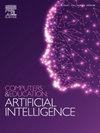The critical role of trust in adopting AI-powered educational technology for learning: An instrument for measuring student perceptions
Q1 Social Sciences
Computers and Education Artificial Intelligence
Pub Date : 2025-01-17
DOI:10.1016/j.caeai.2025.100368
引用次数: 0
Abstract
In recent decades, we have witnessed the democratization of AI-powered Educational Technology (AI-EdTech). However, despite the increased accessibility and evolving technological capabilities, its adoption is accompanied by significant challenges, predominantly rooted in social and psychological aspects. At the same time, limited research has been conducted on human factors, especially trust, influencing students' readiness and willingness to adopt AI-EdTech. This study aims to bridge this gap by addressing the multidimensional nature of trust and developing a new instrument for measuring students' perceptions of adopting AI-EdTech. With 665 student responses, we employ Exploratory and Confirmatory Factor Analysis to provide evidence of the instrument's internal validity and identify four key factors influencing students' trust and readiness to adopt AI-EdTech. We then utilize Structural Equations Modeling to explore the causal relationships among these factors, confirming that students' trust in AI-EdTech positively influences AI-EdTech's perceived usefulness both directly and indirectly through AI-readiness. Finally, we use our instrument to analyze 665 student responses, covering eight courses and Bachelor's and Master's degree programs. Our contribution is two-fold. First, by introducing the empirically validated instrument, we address the need for more consistent and reliable assessments of trust-related factors in student adoption of AI-EdTech. Second, our findings confirm that student demographics, specifically gender and educational background, significantly correlated with their trust perceptions, emphasizing the importance of addressing the specific needs of students with various demographics.
求助全文
约1分钟内获得全文
求助全文
来源期刊

Computers and Education Artificial Intelligence
Social Sciences-Education
CiteScore
16.80
自引率
0.00%
发文量
66
审稿时长
50 days
 求助内容:
求助内容: 应助结果提醒方式:
应助结果提醒方式:


